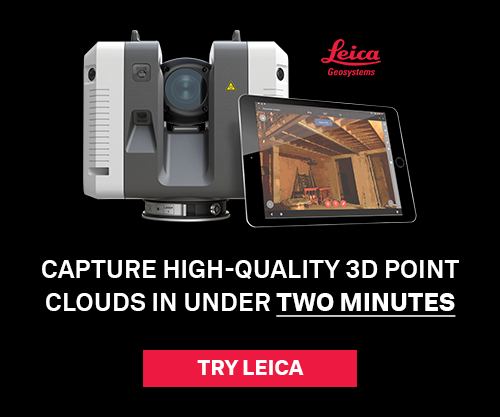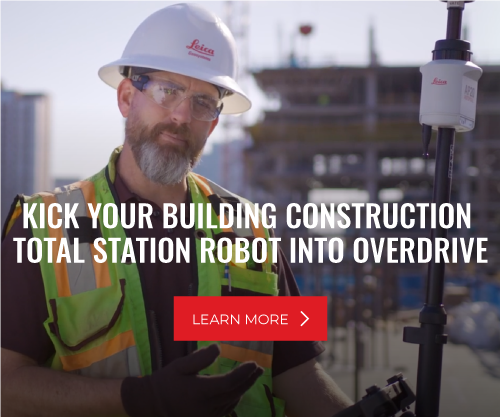Partnering with a specialist in nearly any endeavor can mean extra peace of mind and confidence. Think of the value a foreman represents on a complex project. You want a skilled professional who can efficiently coordinate tasks, ensure quality work, and keep the project on schedule and within budget.
The same holds true with a laser scanning specialist. You want an accomplished partner that delivers exceptional reality capture data for:
- Tracking construction progress
- Documenting existing conditions
- Space planning
- Supporting BIM coordination
- Reducing site visits
Above: A point cloud captured by ENG with the Leica RTC360 laser scanner.
Today architects, engineers, general contractors, specialty contractors and owners can consult the expertise of different laser scanning specialists. Each specialist represents a certain set of skills, hardware, proximity and experience that you should carefully consider before making a selection.
Taking the time to identify the best partner helps:
- If you have in-house scanning capability. An outside resource fills in the gaps when your team is overloaded with projects, an operator is sick or on vacation, or you require a scanning deliverable beyond the scope of your present hardware.
- If you rely on an outside vendor. Contracting allows you to control the timing, technology, results, level of precision and complexity and, perhaps most importantly, the skill and experience of the scanning technician.
“The key is to partner with the right company, that has the right equipment and the right experience,” advises Mariana Jimenez, director of laser scanning & scan to BIM for ENG, a national leader in BIM technology solutions. ENG has a nationwide network of laser scanning specialists, each firm carefully vetted by Jimenez and her team for performance, capability and experience. Jimenez says there is no widely recognized laser scanning accreditation program, so qualifying candidates is important.
1. Verify Experience
“Ask questions. Lots of questions,” Jimenez counsels. “It can be very expensive if you don’t. I would start out by asking about experience. That’s by far the most important one. The scanning company may have experience with only certain property types. They may have little or no experience with scanning dropped ceilings or a raised floor, for example.
“Then there are complex projects that might require nighttime, weekend or working in a high-traffic environment, like a hospital. You want to make sure the service provider can meet expectations and accommodate site challenges,” she says.

The flip side also applies: If a candidate isn’t asking you lots of questions, be wary.
“A good firm needs lots of answers to properly quote the job and deliver the results you expect,” Jimenez says. “What is the captured data going to be used for? What is the required tolerance? What about density? Do you need a color or a grayscale point cloud? What is the desired deliverable format? Where is the project located? Can it be reached by car? What are the data privacy concerns? Will the scanning team have to be escorted during the survey activities?”
2. Plan for Survey Control
One area that’s often overlooked in working with a laser scanning specialist is survey control, Jimenez says. Traditional survey points are still measurement essentials in larger projects. “Depending on numerous factors such as scanning purpose, project size and required accuracy, you’ll probably need to incorporate a traditional survey. This will help registration and ensure needed accuracy,” Jimenez explains. “If that’s the case, this needs to be a budget item. We’ve heard some companies claim you can scan large projects without survey control, and you should second-guess them if your project requires a high level of accuracy.”
Jimenez’s company uses prequalified partners for scanning. ENG is scanner agnostic — any scanner brand is welcomed as long as its capabilities are suitable for the project’s purpose. “There is a lot of scanning hardware out there,” she says, noting that different scanners are good for different things. “It depends on the job.”
“However, I can say our favorite scanner is the RTC360 3D Laser Scanner,” she adds. “The RTC captures high-quality point clouds and imagery and is very versatile which makes it suitable for most of our projects. We are a BIM company, and our modeling teams depend on the quality of the scans. We’re sensitive to bad point cloud data.”
3. Identify Opportunities to Deepen Scanning Expertise
The laser scanning expert knows more and more companies are interested in self-performing reality capture. “There is a lot to consider,” admits Jimenez. To that end, she suggests individuals and companies that want to learn more attend industry conferences and networking events focused on reality capture technology. These gatherings often provide valuable insights and opportunities to connect with experts in the field.
Whether you’re just getting started with laser scanning or need to quickly expand your capabilities, partnering with a laser scanning service provider can be one way to move forward with confidence.
Ready to explore your options? Get in touch with a Leica Geosystems building construction specialist to discuss your needs.








